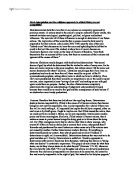It is evident that the Hard Determinism argument presents a logical, scientific theory which has many strengths to support how it negates free will. The Hard Determinism approach has scientific verification to support the argument. Furthermore, it appeals to our understanding of life as nearly in ever decision we make prior events are always thought of. The Clarence Darrow case also supports the theory to negate the freedom of will.
The strengths of Hard Determinism appears to be convincing, however many would argue that there are weaknesses and that it does not negate free will. Hard Determinism removes the principle of moral responsibility; therefore no one can be blamed for any actions. For example, a murderer cannot be held morally responsible for his/hers actions or receive any punishment .In addition the hard determinism theory makes all human beings to be just complicated machines. A Libertarian would argue that Determinist rely on contingent truths. Determinists also treat factors that influence a person’s behaviour as a necessary truth. They stereotype that those from a particular background, must necessarily behave in a particular way.
It is evident that the given weaknesses suggest that hard determinism does not negate free will. Giving this we should look at alternative theories such as, soft determinism. This theory accepts the mechanistic nature of the universe and the principle of cause and effect; however they reflect that free will has a deciding impact on a moral decision. Soft determinists therefore believe that hard determinism and free will are compatible, hence why this theory is otherwise known as ‘compatibalism.’ The soft determinism theory re identifies humanity by allowing a non empirical moral self. Giving this, acting morally independent can override prior causes. Personality and moral self are key factors in soft determinism. The personality is an empirical concept that is formed by heredity and the environment; therefore choices are influences. The moral self is said to overcome external pressures of the personality as it is able to recognise a moral duty. This theory is supported by key thinkers such as Hume, who argued how moral responsibility requires determinism.
The soft determinism approach appears to be a reliable theory that suggests that hard determinism does not negate free will. The strengths are that it allows free will and determinism to be compatible, which suggests that when making a moral decision free will and prior causes both come into effect. This compatiablist idea appears convincing; however as with determinism many would argue that this theory has great weaknesses. For example, it cannot identify the departure point of cause and effect. The theory does not give specific guidelines as to which things are determined and which ones aren’t.
Giving the weaknesses of hard determinism and soft determinism, we should consider a Libertarianism view point. Freedom is the definition of Liberty, and therefore Libertarianism argues that we are free and morally responsible for our actions. Like soft determinists, Libertarians distinguish between a person’s formed personality and there moral self. The strengths of this theory are that it allows moral freedom when faced with a decision. In addition, it allows decisions to be purely based on instinct. Key thinkers such as Campbell argue that moral choice is what distinguishes men from animal. The Libertarianism approach clearly suggests hard determinism does not negate free will. In reply to this argument, hard determinists would argue that there is a difference between experiencing freedom and being free. In addition, a further weakness off the libertarianism argument is that, there are factors that we cannot control such as, genetics and psychology; therefore they must be determined. When making any moral decision other issues always factor in our decisions, for example, emotions and values. Being so, the libertarian idea of total freedom must be flawed as the decisions would be partially determined by these other factors, which therefore suggest that hard determinism negates free will.
In conclusion the evidence presented demonstrates the arguments for and against the statement, ‘Hard Determinism Negates Free Will.’ I personally would argue in favour of the statement because it is scientifically verified that every action is determined by cause and effect.








